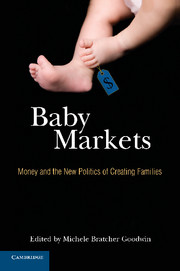Book contents
- Frontmatter
- Contents
- Preface
- Acknowledgments
- Introduction
- PART ONE WHAT MAKES A MARKET? EFFICIENCY, ACCOUNTABILITY, AND RELIABILITY OR GETTING THE BABIES WE WANT
- PART TWO SPACE AND PLACE: REPRODUCING AND REFRAMING SOCIAL NORMS OF RACE, CLASS, GENDER, AND OTHERNESS
- 6 Adoption Laws and Practices: Serving Whose Interests?
- 7 International Adoption: The Human Rights Issues
- 8 Heterosexuality as a Prenatal Social Problem: Why Parents and Courts Have a Taste for Heterosexuality
- 9 Transracial Adoption of Black Children: An Economic Analysis
- PART THREE SPECTRUMS AND DISCOURSES: RIGHTS, REGULATIONS, AND CHOICE
- PART FOUR THE ETHICS OF BABY AND EMBRYO MARKETS
- PART FIVE TENUOUS GROUNDS AND BABY TABOOS
- Author Bios
- Index
- References
6 - Adoption Laws and Practices: Serving Whose Interests?
Published online by Cambridge University Press: 05 August 2012
- Frontmatter
- Contents
- Preface
- Acknowledgments
- Introduction
- PART ONE WHAT MAKES A MARKET? EFFICIENCY, ACCOUNTABILITY, AND RELIABILITY OR GETTING THE BABIES WE WANT
- PART TWO SPACE AND PLACE: REPRODUCING AND REFRAMING SOCIAL NORMS OF RACE, CLASS, GENDER, AND OTHERNESS
- 6 Adoption Laws and Practices: Serving Whose Interests?
- 7 International Adoption: The Human Rights Issues
- 8 Heterosexuality as a Prenatal Social Problem: Why Parents and Courts Have a Taste for Heterosexuality
- 9 Transracial Adoption of Black Children: An Economic Analysis
- PART THREE SPECTRUMS AND DISCOURSES: RIGHTS, REGULATIONS, AND CHOICE
- PART FOUR THE ETHICS OF BABY AND EMBRYO MARKETS
- PART FIVE TENUOUS GROUNDS AND BABY TABOOS
- Author Bios
- Index
- References
Summary
After enactment of the first “modern” state adoption statute by Massachusetts in 1851, and the subsequent abolishment of slavery and indentured servitude by the Thirteenth Amendment to the U.S. Constitution, adoption in the United States, for the next 120 plus years, evolved as both a state judicial process and a specialized child welfare service to promote the so-called best interests of children in need of permanent homes. During the last two decades, however, developments such as (1) increased involvement of the federal government in promoting adoption for children in state foster care, (2) the federally mandated elimination of race from all adoption or foster care placement decision making, and (3) the rapid growth of private adoptions of infants as a “business” should force us to ask whether U.S. adoption today is meeting its original child welfare intent, or is rather serving the interests of adults. President Clinton's heralded Adoption 2002 Initiative and the 1993 Hague Convention on Protection of Children and Co-Operation in Respect of Intercountry Adoption declared an intent to promote the best interests of children adopted within the country or from outside the country – but is this happening?
As we move into the second decade of the new millennium, all serious child advocates and responsible professionals working in the field of adoption should question the efficacy of the current federal prohibition against any consideration of race in adoption or foster care placement decision making.
- Type
- Chapter
- Information
- Baby MarketsMoney and the New Politics of Creating Families, pp. 86 - 93Publisher: Cambridge University PressPrint publication year: 2010
References
- 2
- Cited by



